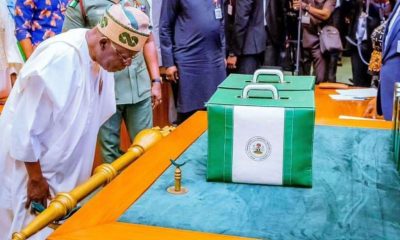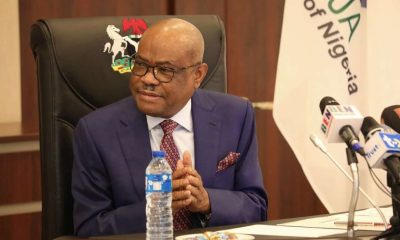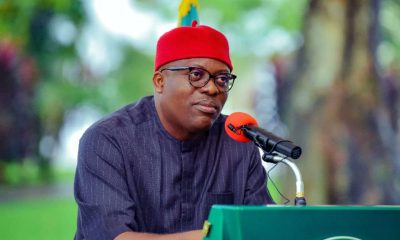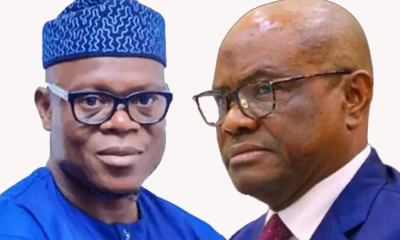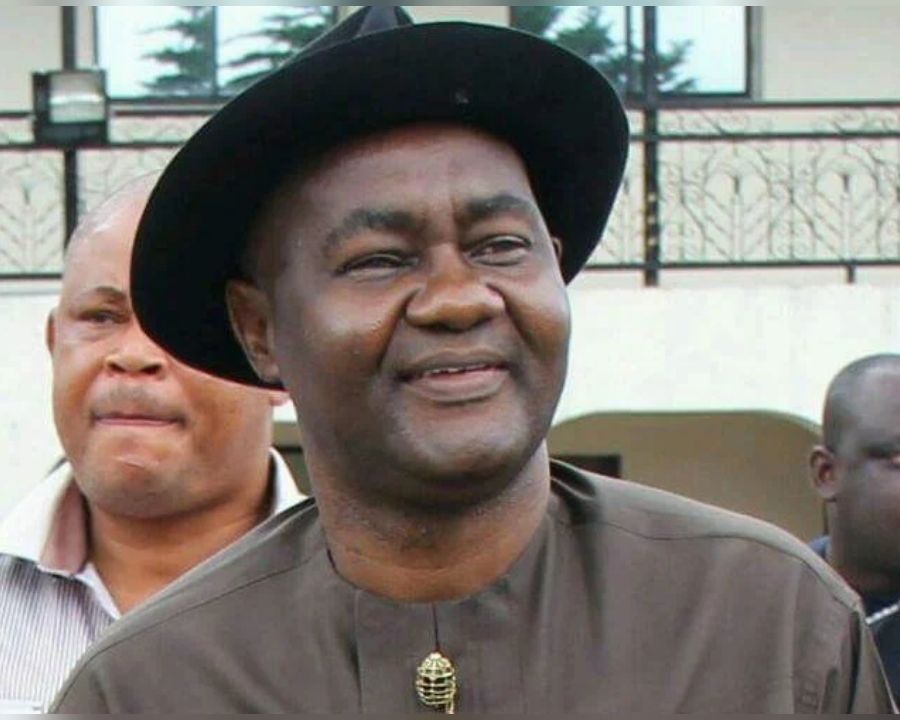Politics
Rivers State: Supreme Court on trial, as FG attempts to defend emergency rule

As the Supreme Court prepares to deliberate on an unprecedented legal stand-off between 11 governors of the opposition Peoples Democratic Party (PDP) and President Bola Tinubu’s administration, the stakes have never been higher, not just for the parties involved, but for the survival of Nigeria’s constitutional democracy.
At the heart of the legal battle is the President’s March 18, 2025, declaration of a state of emergency in Rivers State, along with the suspension of the state’s elected governor, Siminalayi Fubara, his deputy, Prof. Ngozi Odu, and all members of the State House of Assembly. In their place, Tinubu appointed Vice Admiral Ibok Ete Ibas (retd.) as a Sole Administrator to govern the oil-rich state for six months.
The move has sparked outrage, alarm, and fierce opposition – particularly among constitutional lawyers, opposition politicians, and civil society groups – who argue that the action was a flagrant violation of the 1999 Constitution, and an affront to Nigeria’s federal structure.
Now, the Supreme Court stands at a constitutional crossroads and its decision, many fear, will have far reaching implications for the survival of the country’s federalism in democracy. Many questions prick the mind, especially in view of the recent decisions of the apex court with respect to the Rivers political impasse, which many, including former President Goodluck Jonathan, have suggested were handed to it by politicians, as well as provided justification for the emergency rule.
Will it validate what many see as an unlawful power grab, or will it uphold the principles of democratic governance and separation of powers? The Supreme Court has never been in such precarious dilemma.
A Constitutional Crisis in the Making
The suit filed by the 11 PDP governors—representing Adamawa, Enugu, Osun, Oyo, Bauchi, Akwa Ibom, Plateau, Delta, Taraba, Zamfara, and Bayelsa—challenges the legality of the President’s emergency proclamation. In particular, they question whether the President has any constitutional authority to suspend elected officials in a state and impose a Sole Administrator.
The governors, represented by 11 Senior Advocates of Nigeria (SANs), are asking the apex court to determine whether Sections 1(2), 5(2), 176, 180, 188, and 305 of the Nigerian Constitution permit such drastic interference with the democratic governance of a state.
“Whether the President… can lawfully suspend, or in any manner whatsoever, interfere with the offices of a Governor and the Deputy Governor…, and replace same with his own unelected nominee as a Sole Administrator,” reads one of the key questions posed in suit SC/CV/329/2025.
This legal confrontation has far-reaching implications. If the court sides with the President, critics warn, it could set a dangerous precedent—effectively giving future presidents the unchecked authority to remove governors at will, under the guise of emergency declarations.
The Role of the National Assembly: Complicity or Oversight?
One of the most troubling aspects of the unfolding crisis is the apparent acquiescence of the National Assembly. Rather than act as a check on executive overreach, both the Senate and House of Representatives endorsed the emergency rule through a voice vote, offering no meaningful scrutiny of its constitutionality.
“The Constitution is clear,” said Abuja-based constitutional lawyer Olasunkanmi Ajibade. “The President may declare a state of emergency under certain conditions, but the Constitution never envisaged a scenario where elected state officials are removed and replaced with unelected appointees. What happened in Rivers is not just unconstitutional—it’s an assault on democracy.”
Ajibade’s view is echoed across legal circles. “This is a federal republic. The President does not appoint governors,” said Barr. Anthony Chidi, an Abuja based lawyer. “If the Supreme Court validates this, then democracy, as we know it, is finished in Nigeria.”
The National Assembly’s failure to oppose or even debate the legality of Tinubu’s actions raises questions about the strength of Nigeria’s checks and balances. In a functioning democracy, the legislature is expected to guard against executive excesses. But in this case, many see their silence as complicity. Their unwillingness to actually vote to determine its acceptance by members by resorting to voice vote is abdication of responsibility, many argued.
Supreme Court on Trial
As much as the case is about the President and the PDP governors, it is, in truth, the Nigerian Supreme Court that finds itself most squarely in the dock.
The judiciary has been under intense public scrutiny in recent years, with accusations of partisan rulings and executive influence dogging the court. Critics argue that how the court rules in this case could either restore public confidence in its independence or confirm growing suspicions of judicial capture.
“This is not just a case. It’s a defining moment for the Supreme Court,” said Dr. Felix Anozie, a political analyst and legal scholar. “If the judiciary legitimizes this suspension, it will hand future presidents the playbook for dismantling state governments anytime they please. That is a path to authoritarianism.”
This case is widely seen as a test of whether Nigeria’s highest court can serve as the last line of defense for constitutional governance.
Power Grab Cloaked in Law?
Many observers suspect that Tinubu’s emergency rule in Rivers is not just about instability or governance—it is about power, politics, and the 2027 presidential election. Rivers State, with its vast oil wealth and electoral weight, has long been the financial stronghold of the opposition PDP. Since 2015, it has resisted federal control and has remained fiercely independent. But all that changed with the political rivalry—and now uneasy truce—between Governor Fubara and former governor Nyesom Wike, who is a minister in Tinubu’s cabinet.
“What’s going on in Rivers State is all about 2027,” said Chief Tola Adeniyi, veteran columnist and author. “Tinubu wants control over Rivers State’s resources for his re-election campaign, and the only way he could get that is to have Wike in his pocket, and Wike also enjoys it. It’s a mutual back-scratching arrangement—purely political.”
Adeniyi was, especially scathing about the President’s ambitions: “Whatever is going on in Rivers State is about Tinubu’s ambition. You can even imagine this boy, Asari Dokubo, saying that Fubara is not Ijaw,” he added, referencing the recent ethnic provocations that have further heated tensions in the state.
An Explosive Precedent
Legal minds agree that Tinubu’s action, if unchecked, could unravel Nigeria’s delicate federal structure. Section 305 of the Constitution provides limited grounds for the declaration of emergency, including war, breakdown of public order, or natural disasters—but even in such cases, the governor remains in office unless removed through the appropriate constitutional process.
“Nothing in the Constitution gives the President power to suspend a governor,” said constitutional scholar, Dr. Kemi Olagunju. “And definitely not to appoint a Sole Administrator. That is not a democracy. That is dictatorship.”
Even more troubling, some warn, is that this could embolden future administrations to use “emergency rule” as a political tool to destabilize opposition-held states, especially ahead of general elections.
“Today it is Rivers. Tomorrow it could be Oyo, Osun, or Enugu,” Olagunju warned. “What stops a future president from declaring an emergency in Lagos or Kano if opposition forces win there?”
PDP Governors Mobilize Legal Firepower
Aware of the constitutional implications, the 11 PDP governors are not leaving anything to chance. They have assembled an elite team of 11 Senior Advocates of Nigeria and six other lawyers to fight the case. Legal heavyweights, such as Bolaji Ayorinde (SAN), Eyitayo Jegede (SAN), and Kamaldeen Ajibade (SAN) are leading the charge.
On the other side, the Attorney General of the Federation, Lateef Fagbemi (SAN), is working around the clock to draft a robust defense of the President’s actions. According to sources, Fagbemi’s team was still finalizing court processes as of last weekend, with all eyes now on when the Supreme Court will fix a date for the hearing.
“We are ready to test the law,” a senior PDP official said on condition of anonymity. “We believe the law is on our side, and we will not allow this illegal action to stand.”
Political Fallout and National Implications
As Nigeria heads toward the 2027 elections, the Rivers State emergency rule could become a bellwether for federal-state relations. The court’s ruling could either embolden or restrain future attempts to override state autonomy, depending on which way the judgment goes. Ironically, this administration took the governors to the apex court to ensure the autonomy of local government, and prevent the use of sole administrators or caretaker committees by governors to control them, which has ensured that only elected councils get federal allocation.
Meanwhile, political tension continues to escalate in Rivers, with Gov. By Fubara insisting that he remains the legitimate governor despite his suspension, and with protesters rallying across the state in his defense.
For the Nigerian public, this legal drama is more than just a court case—it is a test of the nation’s democratic resilience.
Civil society organizations have also begun to raise their voices. Groups such as the Socio-Economic Rights and Accountability Project (SERAP) and the Transition Monitoring Group (TMG) have warned that failure to uphold constitutional principles in this case could lead to a dangerous slide into authoritarianism.
As the legal fireworks are expected to begin, the Supreme Court has yet to fix a date for hearing the suit. But the political and legal reverberations are already being felt nationwide.
Whatever the outcome, this much is clear: the ruling will not just determine the future of Rivers State, but potentially reshape the balance of power between Nigeria’s presidency and its 36 federating states. And for many Nigerians, the real question is no longer whether the President can suspend a governor—it is whether their highest court will have the courage to say he cannot.



